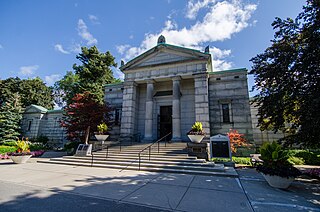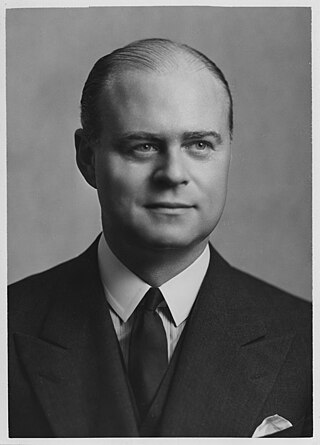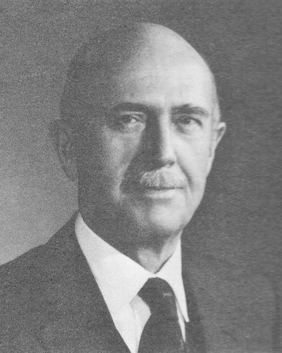Related Research Articles

Mount Pleasant Cemetery is a cemetery located in Toronto, Ontario, Canada, and is part of the Mount Pleasant Group of Cemeteries. It was opened in November 1876 and is located north of Moore Park, a neighbourhood of Toronto. The cemetery has kilometres of drives and walking paths interspersed with fountains, statues and botanical gardens, as well as rare and distinct trees. It was originally laid out by German-born landscape architect Henry Adolph Engelhardt, inspired by the European and American garden cemeteries of the 19th century, and with influences from Mount Auburn Cemetery in Boston.

McLaughlin Motor Car Company Limited was a Canadian manufacturer of automobiles headquartered in Oshawa, Ontario. Founded by Robert McLaughlin, it once was the largest carriage manufacturing factory in the British Empire.

Conrad Moffat Black, Baron Black of Crossharbour, is a Canadian and British former newspaper publisher, businessman, and writer.

Edward Plunket Taylor, CMG was a Canadian business tycoon, investor and philanthropist. He was a famous breeder of Thoroughbred race horses, and a major force behind the evolution of the Canadian horse-racing industry. Known to his friends as "Eddie", he is all but universally recorded as "E. P. Taylor".

Massey Ferguson is a French agricultural machinery manufacturer. The company was established in 1953 through the merger of farm equipment makers Massey-Harris of Canada and the Ferguson Company of the United Kingdom. It was based in Coventry then moved to Beauvais in 2003 due to the Coventry factory shutting down.
Malcolm Wallace McCutcheon, was a Canadian lawyer, actuary and politician.

Colonel Robert Samuel McLaughlin, was a Canadian businessman and philanthropist. He started the McLaughlin Motor Car Company in 1907, one of the first major automobile manufacturers in Canada, which evolved into General Motors of Canada.

The Argus Corporation was an investment holding company based in Toronto, Ontario. During the 1960s and 1970s, it was the most powerful and best known conglomerate in Canada, at one time controlling the companies making up 10 percent of all shares traded daily on the Toronto Stock Exchange.
Varity was a Canadian multinational manufacturing company, created in 1986 from the remains of Massey Ferguson (MF) of Toronto, Ontario, Canada. Varity also owned Perkins Engines, headquartered in Peterborough, England, and Kelsey-Hayes Company, headquartered in Romulus, Michigan, as well as subsidiaries in many countries. After a period of corporate losses left MF insolvent, Varity was formed to detach the ownership of insolvent Massey Ferguson from its liabilities, including pension plans, and enable the Massey Ferguson brand and several subsidiaries to continue as working entities. By the year 2000, Varity itself was defunct, having successfully sold off its divisions.

The Massey family is a Canadian family with Methodist roots that has been prominent since the mid-19th century, known for manufacturing farm equipment and for being patrons of the arts in Canada. The family's manufacturing company, later known as Massey Ferguson, provided the Masseys with their significant fortune. Subsequent generations of Masseys have risen to prominence in the arts, philanthropy and governance. The Massey name remains visible through institutions such as Massey Hall, Massey College and the Massey Lectures.

John Inglis and Company was a Canadian manufacturing firm which made weapons for the United Kingdom and British Commonwealth military forces during the World War II era, then later became a major appliance manufacturer. Whirlpool Corporation acquired control of Inglis in 1987 and changed the company's name to Whirlpool Canada in 2001. Today the Inglis name survives as a brand under Whirlpool.
Parkwood Stable was a thoroughbred racing stable founded in the early 1930s, located at Conlin Road and Simcoe Street North a few miles north of Oshawa, Ontario, Canada. Owned by the wealthy automobile maker Col. Sam McLaughlin, a long-time director of the Ontario Jockey Club, the stable was a significant force in Canadian thoroughbred horse racing whose racing silks and trophies won are on display at the Canadian Horse Racing Hall of Fame in Toronto.

Major General Albert Bruce Matthews was a senior Canadian Army officer and businessman. Although not a professional soldier, he nevertheless rose to be the General Officer Commanding (GOC) of the 2nd Canadian Infantry Division during the final months of the Second World War, after having served with distinction in campaigns in Sicily, Italy and Western Europe from 1943-45. He became noted for his personal bravery and the accuracy and reliability of the artillery under his command. Post-war, his business career continued. In addition, he was active in the Canadian Liberal Party.

The Parkwood Estate, located in Oshawa, Ontario, was the residence of Samuel McLaughlin and was home to the McLaughlin family from 1917 until 1972. The residence was designed by Darling and Pearson, a noted Toronto architectural firm, with construction starting in 1916. In 1989, Parkwood was officially designated a National Historic Site, and tours are now given year-round.
Colonel Maxwell Charles Gordon Meighen, OBE was a Canadian financier and the son of Canadian Prime Minister Arthur Meighen.
Municipal elections were held in Toronto, Ontario, Canada, on December 5, 1960. Six-year incumbent mayor Nathan Phillips was challenged by former mayor Allan Lamport and Controller Jean Newman. Phillips was returned to office.
John Angus "Bud" McDougald was a leading Canadian businessman and owner of Thoroughbred racehorses. In 1975, journalist Peter Newman wrote that, "He may well be the least known and most admired member of the [Canadian] business Establishment. Without question, he is the most powerful."

Lorrie Alfreda Dunington-Grubb was an English landscape architect. She moved to Canada in 1911 with her husband and business partner Howard Dunington-Grubb where they founded Sheridan Nurseries. She was active in garden design, a writer and a patron of the arts.

Pedlar People Limited was a sheet metal stamping operation started in 1861 in Oshawa, Ontario by blacksmith Henry Pedlar in the back of his hardware store. The operation was expanded by his son, George H. Pedlar, to become the largest sheet metal factory in the British Empire. The business was in operation until forced into receivership in 1982. Pedlar People, together with several other small manufacturing operations enabled Oshawa to be considered the "Manchester of Canada."
References
- 1 2 3 4 5 6 nytimes.com: "William E. Phillips, Chairman Of Massey‐Ferguson, Dies at 71"
- 1 2 3 Peter C. Newman 1982, p. 319.
- 1 2 3 4 5 Peter C. Newman 1982, p. 72.
- 1 2 3 "William Eric Phillips"
- ↑ Peter C. Newman 1982, pp. 146–7.
- ↑ "McLaughlin Daughters" (PDF). Parkwood Estate National Historic Site. Parkwood Estate National Historic Site. Retrieved 12 June 2018.
Bibliography
- Peter C. Newman (1982). The Establishment Man: A Portrait of Power. McClelland and Stewart. ISBN 0-7710-6786-0.